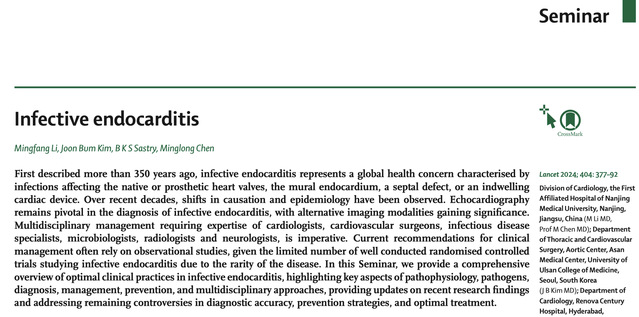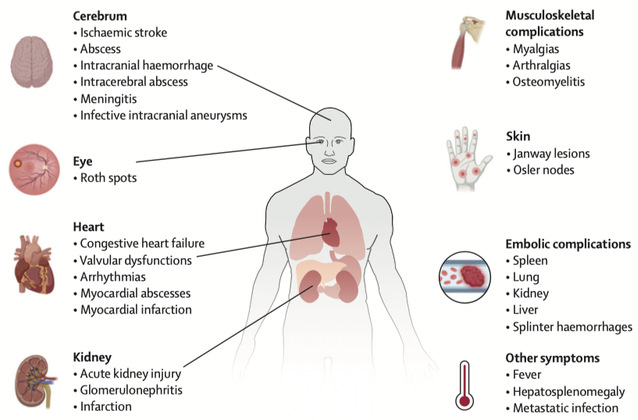On July 27, 2024, a Seminar on infective endocarditis, led by Professor Minglong Chen’s team, was published online in The Lancet, a top international medical journal (2023 impact factor: 98.4). Professor Minglong Chen from the First Affiliated Hospital of Nanjing Medical University (Jiangsu Provincial People's Hospital) served as the corresponding author, with Associate Professor Mingfang Li as the first author. Co-authors include Professor Joon Bum Kim from the Department of Cardiothoracic Surgery at Ulsan University College of Medicine, Seoul, and Professor B K S Sastry from the Department of Cardiovascular Medicine at Renova Century Hospital, India.


The Seminar on infective endocarditis by Professor Minglong Chen’s team was published online in The Lancet on July 27, 2024
The Seminar series in The Lancet provides in-depth discussions on specific medical topics, typically authored by experts in the field. These articles aim to provide physicians, researchers, and students with the latest advancements in research, diagnostic methods, treatment strategies, and future research directions, with a strong emphasis on challenges and solutions in clinical practice. Professor Chen's team, recognized for their expertise in the cardiovascular field both domestically and internationally, lead the writing of this Seminar.
Infective endocarditis is a disease primarily affecting the endocardium, with a particular impact on heart valves. Since its first description in 1674, the disease has predominantly affected young people and is often associated with infections, frequently linked to underlying conditions such as rheumatic heart disease or congenital heart disease. Since the late 1980s, the epidemiology of infective endocarditis has undergone significant changes due to the increasing prevalence of prosthetic valves and interventional cardiac procedures. Despite advances in diagnostic and therapeutic methods, infective endocarditis remains highly challenging, with a mortality rate of up to 30%.

Mechanisms of infective endocarditis
This Seminar on infective endocarditis, primarily authored by Professor Chen's team in collaboration with multidisciplinary experts from around the world, synthesizes new developments and highlights emerging challenges, building upon the 2004 and 2015 editions. The article provides a comprehensive overview of best clinical practices for infective endocarditis, with a focus on its pathophysiology, pathogens, diagnosis, management, prevention, and multidisciplinary approaches. It updates the latest research findings and discusses controversies in current diagnostic accuracy, preventive strategies, and treatment.
The article also summarizes the challenges in the current diagnosis and treatment of infective endocarditis and raises several unresolved clinical questions, such as: How can diagnostic accuracy be further improved for culture-negative infective endocarditis? Which patients are most likely to benefit from prophylactic antibiotics? Which invasive procedures require antibiotic prophylaxis? How should the optimal treatment regimen be determined for infective endocarditis caused by specific pathogens?

Multisystem complications of infective endocarditis
Addressing these issues, Professor Chen pointed out that randomized controlled trials (RCTs) are still lacking in this field, and current recommendations often rely on observational study results. Emerging imaging and microbiological diagnostic technologies, along with advancements in artificial intelligence, are expected to significantly contribute to the field's development, ultimately improving patient outcomes.
After more than six months of repeated discussions and revisions, the Seminar received high praise from the editorial board and four external reviewers, and it was successfully published. This accomplishment represents the voice of China in one of the world’s most prestigious medical journals, highlighting our hospital's significant standing in the international cardiovascular field and promising to bring hope to more patients in the future.
[Drafted from First Affiliated Hospital of NMU; Translated by Dr. Yike Zhang; Reviewed by Professor Minglong Chen, Professor Mingfang Li]



